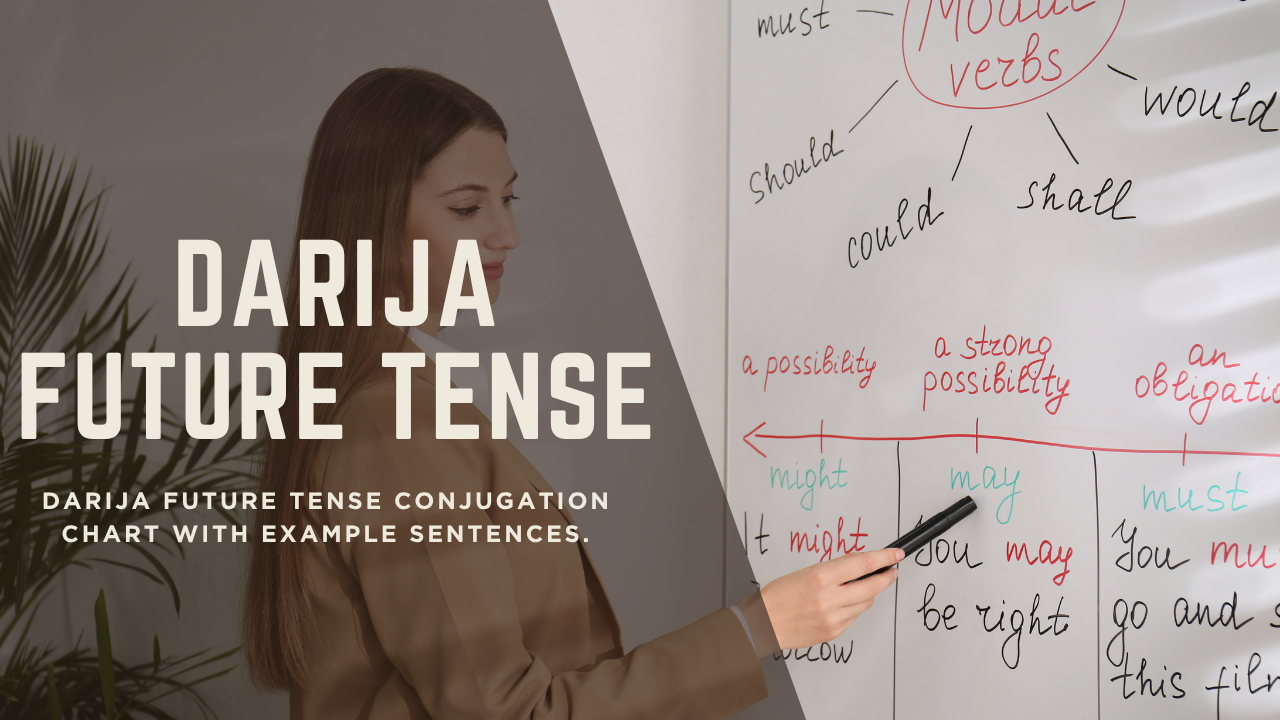Darija Future Tense: How to Talk About What Will Happen

Introduction
Now that you’ve mastered the present and past tenses in Darija, it’s time to look ahead — literally!
In this post, we’ll learn how to express the future tense in Moroccan Arabic so you can say things like “I will go,” “We’ll eat,” or “They will travel.”
The good news? The future tense in Darija is simple — no complex conjugations, just a small prefix before your verb!
1. How the Future Tense Works in Darija
To talk about the future, Darija usually uses the particle “ ghadi ” before the verb.
It’s the equivalent of saying “ going to ” in English.
Formula:
Pronoun + ghadi + verb (in root form)
Example:
-
Ana ghadi namshi (I will go)
-
Hiya ghadi tktab (She will write)
2. Future Tense with All Pronouns
| Pronoun | Example | English |
|---|---|---|
| Ana | Ana ghadi namshi | I will go |
| Nta | Nta ghadi tamshi | You (m) will go |
| Nti | Nti ghadi tamshi | You (f) will go |
| Huwa | Huwa ghadi yamshi | He will go |
| Hiya | Hiya ghadi tamshi | She will go |
| Hna | Hna ghadi namshiw | We will go |
| Ntuma | Ntuma ghadi tamshiw | You (pl) will go |
| Huma | Huma ghadi yamshiw | They will go |
💡 Note:
-
For plural, you often hear “gha” instead of “ghadi” (like “we’re going to”).
-
The verb still uses its present tense form after ghadi.
3. Examples with Common Verbs
-
Kla (to eat)
-
Ana ghadi nakol. → I will eat.
-
Huma ghadi yaklo. → They will eat.
-
-
Shrab (to drink)
-
Hiya ghadi tshrab atay. → She will drink tea.
-
Hna ghadina nshrab l-maa. → We will drink water.
-
-
Ktab (to write)
-
Nti ghadi tkatbi lmessage. → You (f) will write the message.
-
Huwa ghadi ykatb ljawab. → He will write the answer.
-
-
Msha (to go)
-
Ana ghadi namshi lsou9. → I will go to the market.
-
Ntuma ghadina tamshiw lab7ar. → You (pl) will go to the beach.
-
4. Future Time Expressions
| English | Darija | Example |
|---|---|---|
| Tomorrow | ghada | Ghadda ghadi nmshi lamdina. (Tomorrow I’ll go to the city.) |
| Next week | simana jayya | Simana jaya ghadi nabda lkurs. (Next week I’ll start the course.) |
| Later | man b3d | Man ba3d ghadi nshufak. (I’ll see you later.) |
| Soon | 9rib | Ghadi nji 9rib. (I’ll come soon.) |
5. Cultural Note 🇲🇦
Moroccans often use “ghadi” in daily conversations even when speaking casually about plans.
For example:
-
“Ghadi nji daba daba” → I’m coming right now (literally “I’m going to come”).
It’s flexible and can mean “going to” or “will,” depending on the tone and context.
Conclusion
And that’s it! The future tense in Darija is one of the easiest to learn — no tricky endings, just the word ghadi and your verb.
Now you can speak about what’s coming next:
“Ghadi tdir chi tadrib f Darija?” (Will you practice some Darija?)
👉 Next grammar topic in this series: Darija Negation — How to Say ‘Not’ and ‘Don’t’

